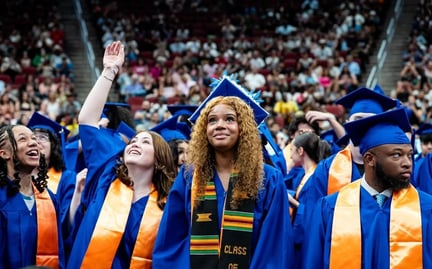My School. My Way. I Thrive.
Utah’s Tuition-Free Online Academy
ThrivePoint Academy offers Utah students in grades 7–12 a flexible, accredited, and tuition-free alternative to traditional school. Whether your student needs a fresh start, a personalized learning plan, or a more supportive environment, we help them succeed — in college, career, and life.
Flexible, Personalized Learning Pathways to Support Every Learner
Not sure which pathway is right for you?
A Learning Model That Works for Real Life
-4.png?width=432&height=274&name=Untitled%20design%20(4)-4.png)
About our Accredited Curriculum
Our accredited curriculum offers a rigorous and engaging education both online and on campus. As a Utah charter school, we maintain a 100% On Track to Graduate rate, preparing students for success through a broad selection of courses and passionate teachers.

50:1 Student Success Coaches
With a low 50:1 student-to-coach ratio, our dedicated coaches provide weekly support, guidance, and advocacy to help students overcome challenges and take confident steps toward their future, whether online or in person.

What's Your Next Big Step
We prepare students for college, careers, and life by combining personalized learning with opportunities in academics, leadership, and extracurriculars. By unlocking students' potential for their Next Big Step, we ensure they leave ThrivePoint ready to achieve their goals and contribute positively to their communities.
.png?width=432&height=432&name=Teacher%20(1).png)
Our Teachers
Our committed teachers bring passion and expertise to every classroom, offering personalized 1-on-1 support to meet each student’s unique learning needs. Supported by transparent salary and qualification disclosures, we invest in our staff to deliver a high-quality, student-focused education that empowers lifelong learning.
Serving Utah Students
Learning isn’t one size fits all. We meet students where they are and offer flexibility for students and families.

Supporting Students Through Life’s Challenges
If your student hasn’t found success in a traditional school setting, we offer a supportive and adaptable space where they can re-engage with learning on their own terms. Whether they’re returning after time away, navigating personal challenges, or simply need a different approach, we’re here to help them move forward with confidence.
We support these learners with:- Personalized learning plans tailored to individual needs
- Emotional and academic support services
- Remote access and flexible scheduling
- A respectful, judgment-free environment

Empowering Independent Learners
If your student is motivated, curious, or simply looking for a more personalized approach to education, we provide a flexible learning environment that adapts to their goals. Whether they’re preparing for college, managing extracurriculars, or seeking a self-paced experience, we’re here to support their growth and independence.
We support these learners with:
- Advanced coursework and independent study options
- Flexible scheduling to accommodate busy lives
- College and career readiness tools
- A structure that respects their autonomy and ambition
What ThrivePoint Students and Parents have to say about us:

“ThrivePoint gave my child the flexibility and support they needed. The staff truly cares, and it shows.”
ThrivePoint
Parent

“I finally feel like I’m learning in a way that works for me. The online format and coaching helped me stay on track.”
ThrivePoint
Student

“Enrollment was easy, and the communication has been great. We feel like part of a real community.”
ThrivePoint
Parent
Public Education Hotline
Complaints or concerns can be filed by following the process as outlined here. Hotline Complaints go directly to the State Board of Education Internal Audit Department and may be referred back to the LEA.
Explore latest educational resources and articles

Join the ThriveHive!
Where students succeed on their terms. Explore flexible learning, real support, and a community built to help you thrive.






